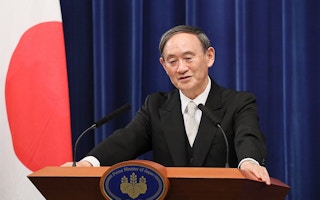Japan will reduce its greenhouse gas emissions to net zero by 2050, its prime minister Yoshihide Suga declared on Monday (26 October), marking a tremendous shift in the nation’s position on the climate emergency.
To continue reading, subscribe to Eco‑Business.
There's something for everyone. We offer a range of subscription plans.
- Access our stories and receive our Insights Weekly newsletter with the free EB Member plan.
- Unlock unlimited access to our content and archive with EB Circle.
- Publish your content with EB Premium.
The country—the world’s third-biggest economy—had previously said it would achieve an 80 per cent cut in emissions and become carbon neutral “as soon as possible” in the second half of the century. Earlier this year, it drew global criticism for failing to ratchet up these targets.
The announcement brings Japan on par with the European Union, which set itself a similar goal last year, and comes in a momentous period for climate action in East Asia, with South Korea making the same commitment and China recently pledging to go carbon neutral by 2060.
“Responding to climate change is no longer a constraint on economic growth,” said Suga in his first policy address to parliament since taking office last month.
“We need to change our thinking to the view that taking assertive measures against climate change will lead to changes in industrial structure and the economy that will bring about growth,” he said.
To meet its goal, Suga explained that Japan would accelerate research and development on key technologies such as next-generation solar cells and carbon recycling, and increase green investments.
He also said the nation would step up energy conservation efforts, deploy renewables to the maximum extent, advance nuclear energy policies with safety at the heart, and alter its policy on coal-fired power generation.
While a welcome step by the fifth-largest emitter of carbon dioxide, tough measures will be required to implement the new policy. The country at present relies heavily on coal and other fossil fuels, and 10 years after the Fukushima nuclear disaster, public opposition to increasing the share of nuclear energy in the mix remains strong.
A country where energy contributes more than 80 per cent to national greenhouse gas emissions, Japan would need to radically transform its current energy plan, which stipulates that thermal power generation, like coal and natural gas, will make up 56 per cent of the energy mix by 2050, with renewables accounting for less than a quarter.
To align itself with the Paris climate deal, a 2018 analysis by Berlin-based non-profit climate science and policy institute Climate Analytics found that Japan would need to phase out most coal-fired power plants by 2030. At the same time, there are huge, yet untapped clean energy resources. Estimates by the country’s environment ministry put the country’s potential for wind power generation at a staggering 1,400 gigawatts.
Japan’s current decarbonisation pledge—or Nationally Determined Contribution under the Paris Agreement—targets an unambitious 26 per cent reduction in emissions by 2030, which has been rated as “highly insufficient” by climate policy research group Climate Action Tracker and could make it difficult to achieve full carbon neutrality by mid-century, experts have warned.
Dr Kentaro Tamura, research director, climate and energy, at the Japan-based Institute for Global Environmental Strategies (IGES), said: “The implications of this new pledge are immense—for the entire economy. It will affect every sector, from steel producers to carmakers, as well as households.”
He said the announcement means Japan would need to take an entirely different approach in drafting its upcoming Strategic Energy Plan, which will chart an energy development path through to 2030. “Previous approaches have been bottom-up, and the government focused on what was possible with available technologies. That needs to change now,” Tamura told Eco-Business.
Commenting on the pledge on Twitter, Christiana Figueres, former executive secretary of the United Nations Framework Convention on Climate Change and one of the architects of the Paris Agreement, congratulated Suga on showing “true leadership” in the race to net zero. However, she added: “Now 2030 targets!”
Japan’s vow comes one week ahead of a presidential election in the United States, in which the rivals vying for the presidency hold starkly different views on climate change, with incumbent Donald Trump intent on withdrawing from the Paris climate deal, and Joe Biden calling for tougher policies to combat global heating.
The 2015 Paris accord aims to curb global warming by capping greenhouse gas emissions, but it permits nations that signed the treaty—a list that includes Japan and most of the countries in the world—to set their own decarbonisation targets.








